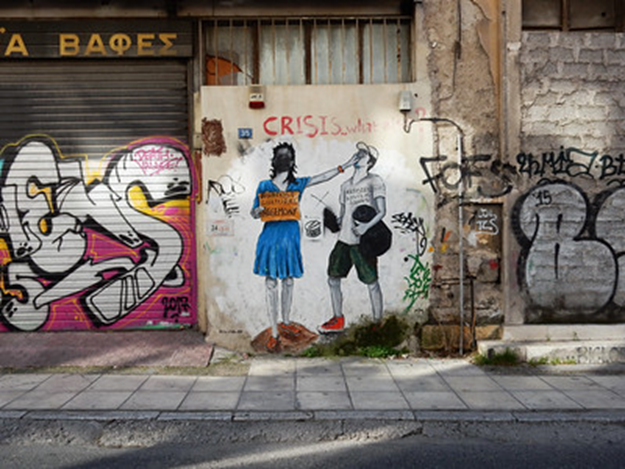Blog

The Walls of Athens as an Archive of Anti-Austerity Movements
Stella Koudouma (ReAct intern) Any walk through the center of Athens involves a visual encounter with street art and graffiti. Murals, like the one above, can be found all over the city center and are emblematic of the austerity period. Crisis as ever-present in contemporary Greece is captured by the slogan “Crisis…what else?”, which…
Read more
From the Archive to the Museum: 15M Exhibited
África López Zabalegui (ReAct intern) In 2021, for the 10th anniversary of the Indignados protest (most commonly known in Spain as 15M), the Reina Sofía Museum in Madrid included part of the movement’s archive in its permanent exhibition. As I was spending my Christmas holidays back home in Madrid, I decided to visit it. The…
Read more
The Contentious Subject Speaks
Duygu Erbil & Clara Vlessing This blog draws from a presentation we gave as part of ReAct’s recent conference on “Remembering Contentious Lives”. Speeches and speaking have long been essential to contentious politics. While oratory practices are shared across different repertoires of contention, the ideal of the freedom of speech has been an underlining principle…
Read more
Micro-celebrity Practices in the Commemoration of Deniz Gezmiş
Duygu Erbil It was 6 May 2022 and, like hundreds of other people in Karşıyaka Cemetery, Ankara, I was visiting the tomb of the Marxist-Leninist martyr Deniz Gezmiş to observe the 50th anniversary of the execution of Gezmiş and his two other comrades. Most of those visiting the cemetery that day were leftist or centrist…
Read more
The Cross-pollination of Memories between Black and LGBT+ Activism
Daniele Salerno: In spring, thanks to wind and insects, pollen grains can be carried from one flower to another of a different variety. This is what botanists call cross-pollination, and it sustains natural diversity. As Lisa M. Corrigan argues in her work, cross-pollination also exists in culture: stories may travel over to other stories, moved…
Read more
Using Memory: The anti-colonial periodical Indonesia Merdeka (1923-1933)
Anna Stibbe: That Indonesia and the Netherlands share history is a well-known fact, but this history has been told in a completely different way on each side. The recent commotion around the term Bersiap – used only in the Netherlands to indicate the period of extreme violence in Indonesia in 1945-1946 – made this painfully…
Read more
Colour: Remembrance as Resistance
Ann Rigney: A former municipal swimming pool in the Belgian city of Liège is now home to a museum called the Cité Miroir, dedicated to “citizenship, memory, and intercultural dialogue”. On permanent display is an exhibition devoted to the memory of struggles for social justice and workers’ rights in this heavily industrialized province. The catalogue…
Read more
International ‘Workers’ Day?
Sophie van den Elzen: We will be missing open-air celebrations of May Day this year. There will be few Russians on the Red Square for the variety of causes which May 1st has come to mark since the collapse of the Soviet regime. The tradition of having mass anti-austerity, anti-capitalist, anti-government, and decolonial protests on…
Read more
Trans Memory Activism and Visibility: Archivo de la Memoria Trans Argentina
Daniele Salerno: The Archivo de la Memoria Trans Argentina represents a group of trans activists who collect, organize, and circulate photographs and written materials (diaries, letters, postcards) about trans people in Argentina, with a focus on visual archiving. In 2020, in collaboration with Editorial Chaco, this group published an eponymous selection of photos and archival…
Read more
Remixing the Past: The Soundtrack to Black Lives Matter
Marit van de Warenburg: The Black Lives Matter (BLM) protests that shook up both sides of the Atlantic last summer, in the aftermath of the killing of George Floyd by Minneapolis police officers, were infused by music. In the United States, songs such as Anderson.Paak’s “Lockdown” and H.E.R.’s “I Can’t Breathe” sought to capture the…
Read more
Memory Activism and Transitional Justice in Spain
David Beorlegui Zarranz: On 15 September 2020, the Spanish Council of Ministers approved a draft bill on the Law of Democratic Memory which acknowledged the crimes committed during the Civil War (1936-1939) and the Francoist military dictatorship (1939-1978). Despite the magnitude of the Franco regime’s violence and the deep scars it left on the social…
Read more
Activism Remembered Through the Courtroom
Duygu Erbil: The widespread availability of smartphones has provided activists with new tools to document protest and ensure that its memory is preserved. The Internet is full of advice on how to keep electronic devices safe during demonstrations so as to minimize the risk of evidence – of numbers, of peacefulness, of police brutality –…
Read more
Memory in Antagonistic Politics: Minutes from an “Antifascist September” in Greece
Emilia Salvanou: On Wednesday 7 October, the Supreme Court of Greece passed its long-awaited verdict on the Golden Dawn party, declaring it to be a criminal organization. It was also held responsible for a series of violent attacks on immigrants and on its political opponents. This judicial milestone was in marked contrast to the relative…
Read more
Why Monuments Matter (And When They Don’t)
Ann Rigney: In the centre of Paris on the afternoon of 16 May 1871 a huge crowd was waiting to the sound of the Marseillaise. Around a quarter past five, an expectant silence fell on the company as, after hours of preparation, the sign was given for the cables to be pulled. All eyes were…
Read more
‘My Body My Choice’: Why the Anti-Lockdown Protesters are Appropriating Memory
Tashina Blom: While Trump is egging them on and Bolsonaro has even joined them and called them “patriots”, the protesters taking to the streets against the coronavirus lockdown are mobilizing more than just nationalist rhetoric. They are weaponising feminist slogans from the abortion rights movement. The question is: why? Why would anti-lockdown protests become a…
Read more
Delacroix in Hong Kong: Activism, Memory and Visual Representation
Thomas Smits: Yesterday evening World Press photo announced the winners of its 2020 contest. Nicolas Asfouri won the first prize in the General News category for his series ‘Hong Kong Unrest,’ which documents the vehement, unprecedentedly-large and long-lasting, anti-government protests in the city. Describing the first picture in the series, the World Press website notes:…
Read more
International Women’s Day: Why is it on 8 March?
Clara Vlessing: On 8 March, International Women’s Day (IWD), last year I marched through the streets of Amsterdam in a tide of shouting placard-wielding protestors. By planning the protest on this day, its organisers imbued it with a sense of historicity, aiming to emphasise the changes and continuities in a long-running progression of women’s marches…
Read more
My Grandmother the Militant: Activism as a Family Story
Daniele Salerno: Her name was Alicia Raquel Delaporte but everybody called her “la gorda Silvia”. For the 21-year-old artist Ezequiel Yrurtia la gorda Silvia was “mi abuela”: his grandmother. Yet, Yrurtia never met his grandmother. Instead he decided to reconstruct her story by gathering pictures, oral testimonies and traces of her life. The result is…
Read more
ActivistTM: Conspicuous Consumption and Social Change
Sophie van den Elzen: What does the good fight smell like? For the 2019 holiday season, well-known cosmetics franchise The Body Shop has laid claim to the answer and has bottled a “lasting warm and spicy scent” under the name ActivistTM. I recently came across this product during my Christmas shopping and had difficulty picturing…
Read more
Recursive Waves
Ann Rigney: In the last weeks the headlines have been full of protesters. Each day seems to introduce a new flashpoint. Thousands of Dutch farmers on tractors resisting government measures to reduce nitrogen emissions while thousands of their fellow citizens perform lie-ins in the name of Extinction Rebellion. A massive crowd marching on Westminster waving…
Read more

